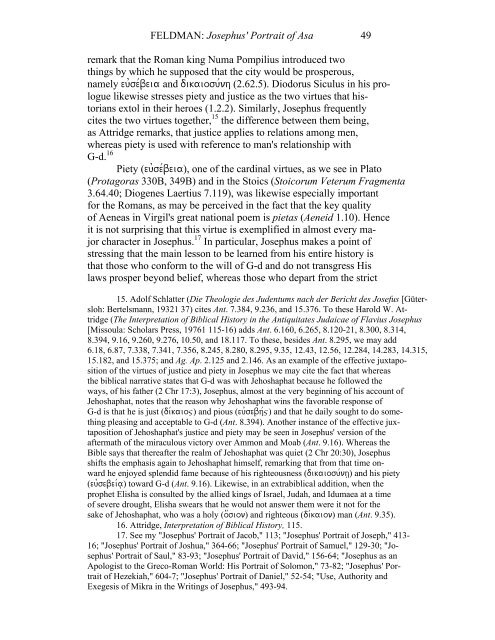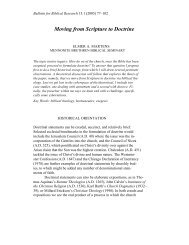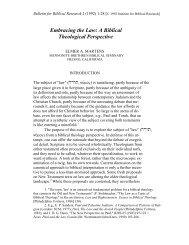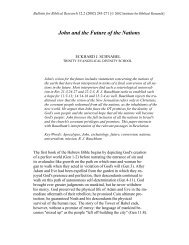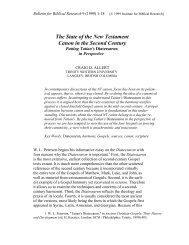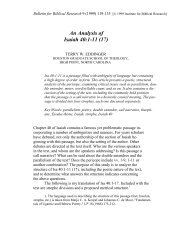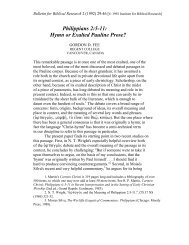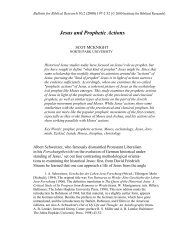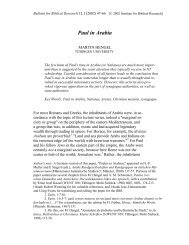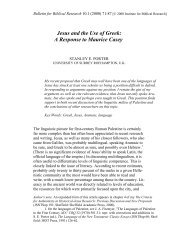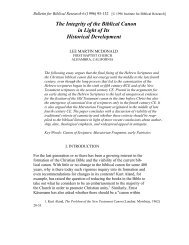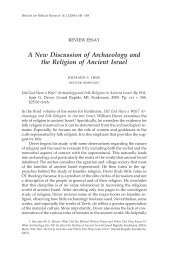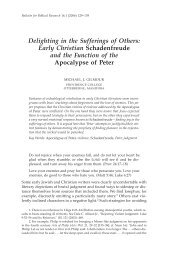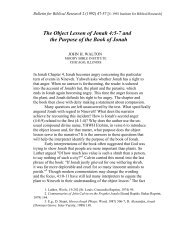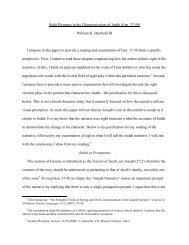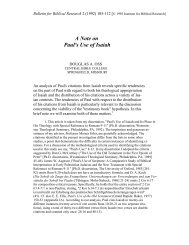Josephus' Portrait of Asa - Institute for Biblical Research
Josephus' Portrait of Asa - Institute for Biblical Research
Josephus' Portrait of Asa - Institute for Biblical Research
Create successful ePaper yourself
Turn your PDF publications into a flip-book with our unique Google optimized e-Paper software.
FELDMAN: <strong>Josephus'</strong> <strong>Portrait</strong> <strong>of</strong> <strong>Asa</strong> 49<br />
remark that the Roman king Numa Pompilius introduced two<br />
things by which he supposed that the city would be prosperous,<br />
namely eu0se/beia and dikaiosu/nh (2.62.5). Diodorus Siculus in his prologue<br />
likewise stresses piety and justice as the two virtues that historians<br />
extol in their heroes (1.2.2). Similarly, Josephus frequently<br />
cites the two virtues together, 15 the difference between them being,<br />
as Attridge remarks, that justice applies to relations among men,<br />
whereas piety is used with reference to man's relationship with<br />
G-d. 16 Piety (eu0se/beia), one <strong>of</strong> the cardinal virtues, as we see in Plato<br />
(Protagoras 330B, 349B) and in the Stoics (Stoicorum Veterum Fragmenta<br />
3.64.40; Diogenes Laertius 7.119), was likewise especially important<br />
<strong>for</strong> the Romans, as may be perceived in the fact that the key quality<br />
<strong>of</strong> Aeneas in Virgil's great national poem is pietas (Aeneid 1.10). Hence<br />
it is not surprising that this virtue is exemplified in almost every major<br />
character in Josephus. 17 In particular, Josephus makes a point <strong>of</strong><br />
stressing that the main lesson to be learned from his entire history is<br />
that those who con<strong>for</strong>m to the will <strong>of</strong> G-d and do not transgress His<br />
laws prosper beyond belief, whereas those who depart from the strict<br />
15. Adolf Schlatter (Die Theologie des Judentums nach der Bericht des Josefus [Gütersloh:<br />
Bertelsmann, 19321 37) cites Ant. 7.384, 9.236, and 15.376. To these Harold W. Attridge<br />
(The Interpretation <strong>of</strong> <strong>Biblical</strong> History in the Antiquitates Judaicae <strong>of</strong> Flavius Josephus<br />
[Missoula: Scholars Press, 19761 115-16) adds Ant. 6.160, 6.265, 8.120-21, 8.300, 8.314,<br />
8.394, 9.16, 9.260, 9.276, 10.50, and 18.117. To these, besides Ant. 8.295, we may add<br />
6.18, 6.87, 7.338, 7.341, 7.356, 8.245, 8.280, 8.295, 9.35, 12.43, 12.56, 12.284, 14.283, 14.315,<br />
15.182, and 15.375; and Ag. Ap. 2.125 and 2.146. As an example <strong>of</strong> the effective juxtaposition<br />
<strong>of</strong> the virtues <strong>of</strong> justice and piety in Josephus we may cite the fact that whereas<br />
the biblical narrative states that G-d was with Jehoshaphat because he followed the<br />
ways, <strong>of</strong> his father (2 Chr 17:3), Josephus, almost at the very beginning <strong>of</strong> his account <strong>of</strong><br />
Jehoshaphat, notes that the reason why Jehoshaphat wins the favorable response <strong>of</strong><br />
G-d is that he is just (di/kaioj) and pious (eu0sebh/j) and that he daily sought to do something<br />
pleasing and acceptable to G-d (Ant. 8.394). Another instance <strong>of</strong> the effective juxtaposition<br />
<strong>of</strong> Jehoshaphat's justice and piety may be seen in <strong>Josephus'</strong> version <strong>of</strong> the<br />
aftermath <strong>of</strong> the miraculous victory over Ammon and Moab (Ant. 9.16). Whereas the<br />
Bible says that thereafter the realm <strong>of</strong> Jehoshaphat was quiet (2 Chr 20:30), Josephus<br />
shifts the emphasis again to Jehoshaphat himself, remarking that from that time onward<br />
he enjoyed splendid fame because <strong>of</strong> his righteousness (dikaiosu/nh|) and his piety<br />
(eu0sebei/a|) toward G-d (Ant. 9.16). Likewise, in an extrabiblical addition, when the<br />
prophet Elisha is consulted by the allied kings <strong>of</strong> Israel, Judah, and Idumaea at a time<br />
<strong>of</strong> severe drought, Elisha swears that he would not answer them were it not <strong>for</strong> the<br />
sake <strong>of</strong> Jehoshaphat, who was a holy (o3sion) and righteous (di/kaion) man (Ant. 9.35).<br />
16. Attridge, Interpretation <strong>of</strong> <strong>Biblical</strong> History, 115.<br />
17. See my "<strong>Josephus'</strong> <strong>Portrait</strong> <strong>of</strong> Jacob," 113; "<strong>Josephus'</strong> <strong>Portrait</strong> <strong>of</strong> Joseph," 413-<br />
16; "<strong>Josephus'</strong> <strong>Portrait</strong> <strong>of</strong> Joshua," 364-66; "<strong>Josephus'</strong> <strong>Portrait</strong> <strong>of</strong> Samuel," 129-30; "<strong>Josephus'</strong><br />
<strong>Portrait</strong> <strong>of</strong> Saul," 83-93; "<strong>Josephus'</strong> <strong>Portrait</strong> <strong>of</strong> David," 156-64; "Josephus as an<br />
Apologist to the Greco-Roman World: His <strong>Portrait</strong> <strong>of</strong> Solomon," 73-82; "<strong>Josephus'</strong> <strong>Portrait</strong><br />
<strong>of</strong> Hezekiah," 604-7; "<strong>Josephus'</strong> <strong>Portrait</strong> <strong>of</strong> Daniel," 52-54; "Use, Authority and<br />
Exegesis <strong>of</strong> Mikra in the Writings <strong>of</strong> Josephus," 493-94.


